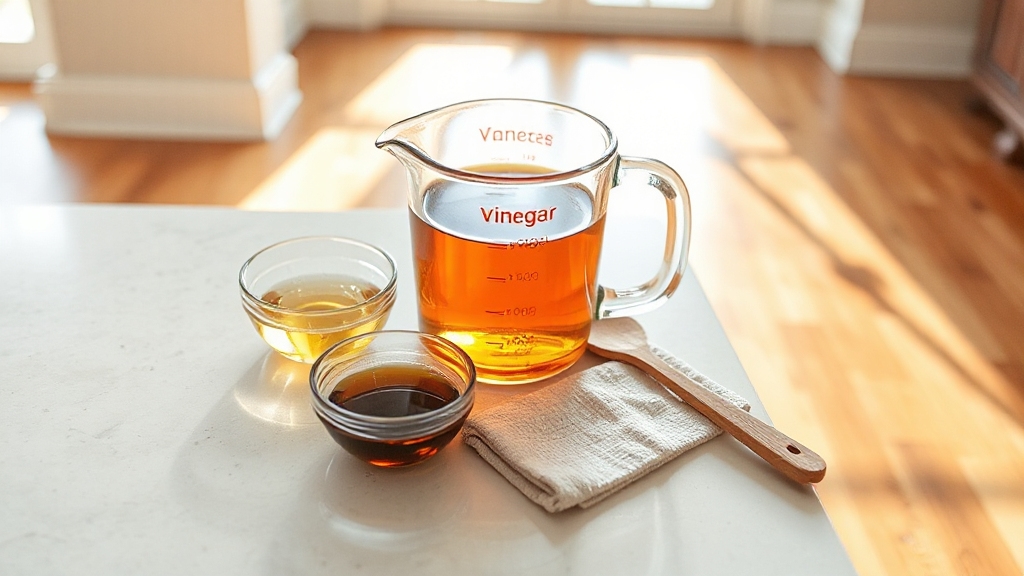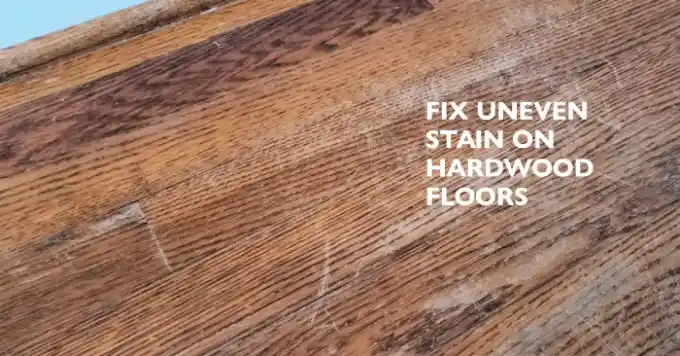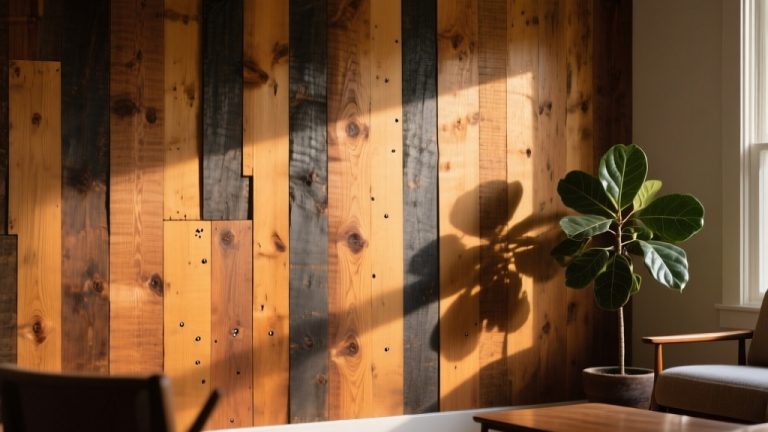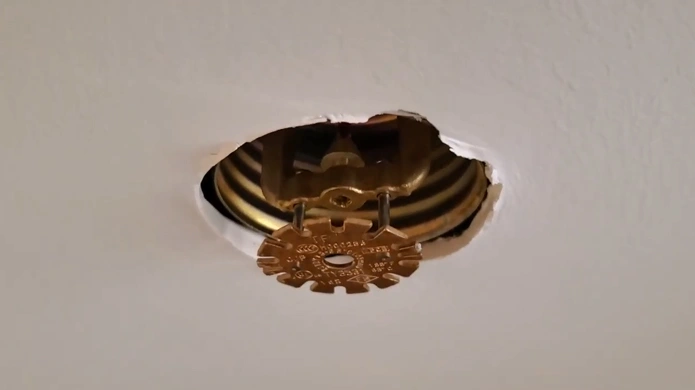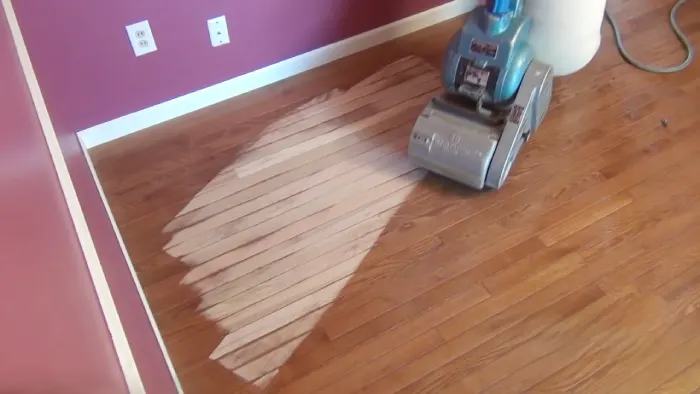Homemade Hardwood Floor Cleaner Recipe: Simple Ingredients
You can easily make a gentle hardwood floor cleaner by mixing ½ cup of white vinegar with one gallon of warm water and adding a few drops of your favorite essential oil for a fresh scent.
Sweep first, then mop lightly with a well-wrung mop, going with the wood grain to avoid damage. Always test a small area first and dry immediately. For tips on alternative recipes and thorough care, keep exploring the best practices to maintain your floors’ beauty.
Key Takeaways
- Mix ½ cup white distilled vinegar with one gallon of warm water for a gentle, effective hardwood floor cleaner.
- Add 2–5 drops of essential oils like lemon or cedarwood for a fresh scent and enhanced cleaning power.
- Use a well-wrung microfiber mop to apply the solution, mopping in the direction of the wood grain to avoid damage.
- Test the cleaner on a small, hidden area before full use to ensure it doesn’t harm the floor finish.
- Dry floors immediately after mopping and avoid excessive moisture to prevent warping or finish damage.
Benefits of Using Homemade Hardwood Floor Cleaners
Although commercial hardwood floor cleaners are widely available, making your cleaner at home offers several distinct advantages. You’ll save money since homemade solutions use inexpensive, common household items, cutting costs over time, especially for large floor areas.
Plus, you’ll reduce exposure to harsh chemicals and synthetic fragrances, creating a safer environment for your family and pets. Homemade cleaners are gentle on wood finishes, avoiding damage from strong detergents and preventing buildup that attracts dirt.
However, test homemade mixtures like vinegar solutions on a small, hidden area first to avoid dulling finishes. Always ensure to avoid excess moisture when cleaning to protect the wood finish.
You can customize your cleaner’s strength and scent, tailoring it to your floor type and personal preference. Using eco-friendly ingredients also minimizes environmental impact by reducing pollution and waste from commercial product packaging.
Essential Ingredients for DIY Hardwood Floor Cleaners
When creating your own hardwood floor cleaner, selecting the right ingredients is essential to protect your floors while effectively removing dirt and grime. White vinegar, diluted properly, acts as your core cleaner by breaking down buildup without harming finishes.
Adding essential oils like lemon or cedarwood enhances scent and adds antimicrobial benefits. A small amount of olive oil can condition wood, maintaining moisture and shine. Mild dish detergent boosts cleaning power, while water dilutes to safe levels. Use barely damp tools to avoid damage.
Many people prefer homemade cleaners because they avoid the harsh, toxic chemicals found in conventional products, making the home safer for children and pets. Maintaining proper humidity levels also helps preserve the condition of hardwood floors over time.
| Ingredient | Purpose | Recommended Amount |
|---|---|---|
| White Vinegar | Dirt remover, natural acid | ½ cup per gallon warm water |
| Essential Oils | Fragrance, antimicrobial | 2–30 drops per gallon |
| Olive Oil | Conditioning, shine | 1 teaspoon per batch |
| Mild Detergent | Removes oily residues | Few drops per gallon |
Step-by-Step Vinegar-Based Hardwood Floor Cleaner Recipe
Start by measuring half a cup of white distilled vinegar into a gallon of warm water for a balanced cleaning solution. This mixture is effective because vinegar helps to neutralize odors and kill bacteria commonly found in hardwood floor stains.
Mix gently to combine, then add a few drops of your favorite essential oil to freshen up the scent.
When applying, use a well-wrung mop and always test a small area first to protect your floor’s finish. Always consult a floor specialist or perform a spot test since floor types vary in their response to vinegar-based cleaners.
Ingredient Measurements Guide
A dependable vinegar-based hardwood floor cleaner begins with precise ingredient measurements to guarantee effective cleaning without damaging your floors.
Start by mixing 1/2 cup of white distilled vinegar with 1 gallon of warm or hot water for a standard solution. Using too strong an adhesive or residue-causing product on your floor can lead to surface damage if not properly maintained.
If your floors are sensitive, reduce vinegar to 1/4 cup per gallon. For spray mops, use about 3 teaspoons of vinegar per 16 ounces of water.
Always dilute vinegar properly never use it full strength to protect sealed hardwood. You can add 2 to 5 drops of essential oils like lemon for a fresh scent, but keep additives minimal to avoid residue. Before full application, test the vinegar solution in an inconspicuous area to ensure it does not harm the floor finish.
Mixing Instructions Overview
Before you begin cleaning, gather your materials and prepare a clean bucket with about one gallon of warm or hot water to guarantee proper dilution and effective mopping. Maintaining proper humidity levels is also essential to protect your hardwood floors from damage and soft spots.
Add ½ cup of distilled white vinegar to the water, maintaining the correct ratio for safe and efficient cleaning. If you like, include 2 to 5 drops of essential oils such as lemon or lavender for a pleasant scent and mild extra cleaning power.
Stir the mixture thoroughly to blend vinegar and water evenly. Avoid adding soaps or detergents, as vinegar alone cleans without leaving residue. This basic, effective cleaning option provides a natural shine without harsh chemicals.
Make sure to test this solution on a small, hidden section of your sealed hardwood floor before full application, ensuring it won’t dull or damage the finish. Early detection of water damage signs can prevent more extensive repairs and maintain floor integrity.
Application and Safety Tips
Although vinegar is a powerful natural cleaner, you’ll want to utilize it cautiously on hardwood floors to protect their finish.
Start by sweeping or vacuuming to remove dirt and dust, and always test the solution on a hidden spot. Using a soft-bristled brush attachment on your vacuum can help prevent scratches during this initial cleaning step.
Use a diluted mix ½ cup white vinegar per gallon of warm water—and dampen your microfiber mop lightly to prevent excess moisture. Vinegar’s acidic nature can gradually break down the protective finish on hardwood floors if used too frequently.
Mop in small sections, drying each immediately with a clean cloth. Keep these tips in mind:
- Avoid vinegar on unsealed or waxed wood to prevent damage
- Don’t mix vinegar with other cleaners to avoid residue buildup
- Prevent standing water to stop wood warping
- Ensure good ventilation to avoid inhaling vapors
- Use vinegar cleaning sparingly, about once a month, for best results
Alternative Natural Cleaner Recipes for Hardwood Floors
When you want to clean your hardwood floors naturally, several effective homemade recipes can help you avoid harsh chemicals while maintaining your floor’s beauty.
A vinegar-based cleaner 1/2 cup distilled white vinegar in a gallon of warm water—cuts grime effectively; add lemon or lavender essential oils to mask vinegar’s smell and freshen the air. It is important to use a barely damp mop to avoid excess water that could damage the wood finish.
For conditioning, mix 3/4 cup olive oil with 1/2 cup lemon juice in a gallon of water to polish and nourish wood, but use oils sparingly to prevent residue. Black tea steeped in water offers a gentle, tannin-rich option that enhances shine and darkens wood subtly.
If you prefer no vinegar, try essential oils diluted in warm water for a mild, fragrant cleaner safe for sensitive users and pets.
Best Practices for Applying Homemade Hardwood Floor Cleaners
Choosing the right homemade cleaner is just the start; applying it properly makes all the difference in protecting and enhancing your hardwood floors. Before you begin, sweep or vacuum thoroughly to remove dust.
Regular vacuuming with a soft-bristled brush attachment prevents scratches caused by dirt accumulation and ensures efficiency. Always test your cleaner on a small spot to avoid damage. Use a well-wrung damp mop or microfiber mop, and apply the cleaner lightly never flood the floor.
Mop in the wood grain direction for even cleaning and avoid excess moisture to protect the finish. Regular maintenance and gentle cleaning not only preserve the floor’s appearance but also extend the lifespan of your hardwood.
Here’s a quick checklist for best application:
- Remove sticky spots manually before mopping.
- Spray cleaner on the mop, not directly on the floor.
- Let cleaner sit briefly to break down dirt.
- Dry immediately with a microfiber cloth.
- Avoid walking on floors until fully dry.
Following these steps preserves your hardwood’s beauty and longevity.
Safety Tips and Precautions When Cleaning Hardwood Floors
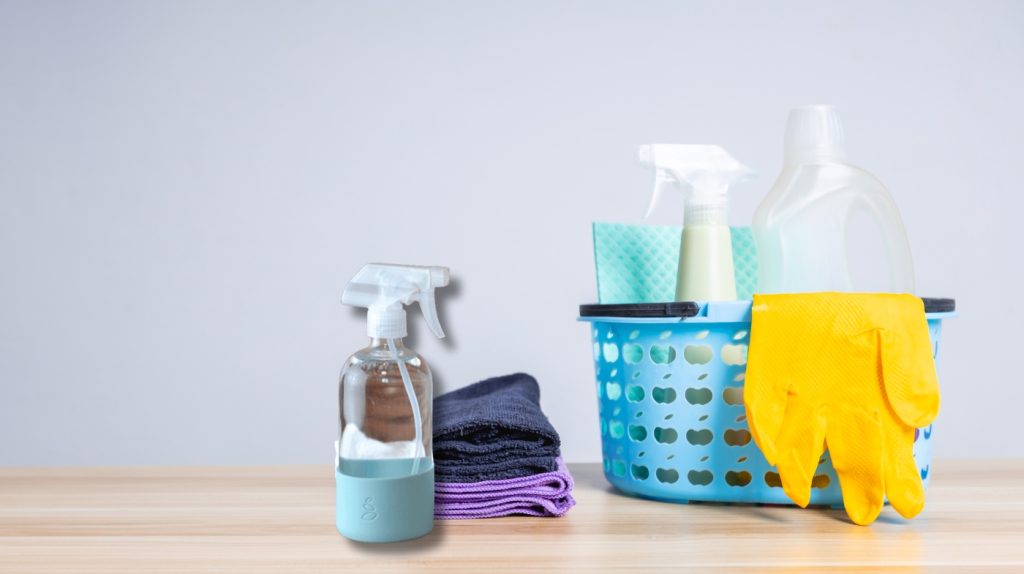
Since hardwood floors are delicate and costly to maintain, you need to handle cleaning with caution to avoid damage and ensure safety. Never use excessive water or wet mops, as standing moisture causes warping and dulling the surface. Avoid steam cleaners and oil-based polishes, which harm the finish and create slippery surfaces.
Always vacuum or sweep before mopping with a damp microfiber pad, limiting water use to heavy-traffic areas twice a month. When vacuuming, make sure to turn off the brush roll to prevent scratching and use a vacuum set to hard floor mode.
Wear non-slip shoes while cleaning to prevent falls, and never mix cleaning solutions to avoid harmful fumes. Store all products safely away from children and pets. Use felt pads under furniture to prevent scratches, trim pet nails regularly, and maintain stable indoor humidity to protect your floors long-term.
Frequently Asked Questions
How Long Can Homemade Hardwood Floor Cleaner Be Stored Safely?
You can safely store homemade hardwood floor cleaner for about 2 to 4 weeks to keep it fresh and effective. Beyond a month, its potency drops, and microbial growth might occur since there are no preservatives.
Keep it in a cool, dark place, using airtight glass containers, and shake well before each use. Always check for off smells, discoloration, or mold, and discard it if you notice any of these signs.
Can Homemade Cleaners Be Used on All Types of Wood Flooring?
You can’t use homemade cleaners on all wood flooring types without caution. Sealed floors with polyurethane or acrylic finishes usually handle mild homemade solutions well.
But waxed, oil-finished, unsealed, or laminate floors need special care some homemade ingredients might damage their finish or cause warping. Always test first on a hidden spot and avoid excess water or acidic components on sensitive surfaces to keep your floors safe and beautiful.
What Mop Types Work Best With Homemade Hardwood Floor Cleaners?
You’ll want to use microfiber or Cuban mops with homemade hardwood floor cleaners since they control moisture well and gently clean without scratching.
Spin mops with wringers help you avoid excess water, while flat mops with reusable microfiber pads cover large areas efficiently. Spray mops give you precise cleaner application, preventing over-wetting.
Always wring mop heads thoroughly to keep them damp, not wet, protecting your floor’s finish and longevity.
How Often Should Hardwood Floors Be Cleaned With Homemade Solutions?
Think of your hardwood floor as a delicate canvas you don’t want to flood it with paint. You should clean it with homemade solutions about once a week in busy areas, using just a damp mop to avoid damage.
For low-traffic spots, cleaning every month or quarter works fine. Always wipe spills promptly, and avoid over-wetting the floor to keep it looking fresh and lasting longer. Adjust frequency based on foot traffic and dirt buildup.
Are Homemade Hardwood Floor Cleaners Safe for Pets and Children?
You can keep pets and children safe by choosing homemade hardwood floor cleaners without harsh chemicals like ammonia or formaldehyde. Stick to gentle ingredients like diluted vinegar or liquid castile soap, which clean effectively without toxic fumes or skin irritants.
Avoid essential oils unless you know they’re pet-safe, and never use acidic additives like lemon juice. This way, you reduce health risks like poisoning, allergies, or respiratory problems for your family and furry friends.
Test Before You Tidy: Safety First for Your Floors
Just like a trusted old friend, your hardwood floors deserve care that’s gentle yet effective. By using homemade cleaners, you’re not only protecting your natural beauty but also creating a safer, healthier home.
With simple ingredients and mindful application, you can keep your floors shining without harsh chemicals. So, roll up your sleeves and treat your floors the way they’ve treated you—standing strong and looking great through every step you take.

